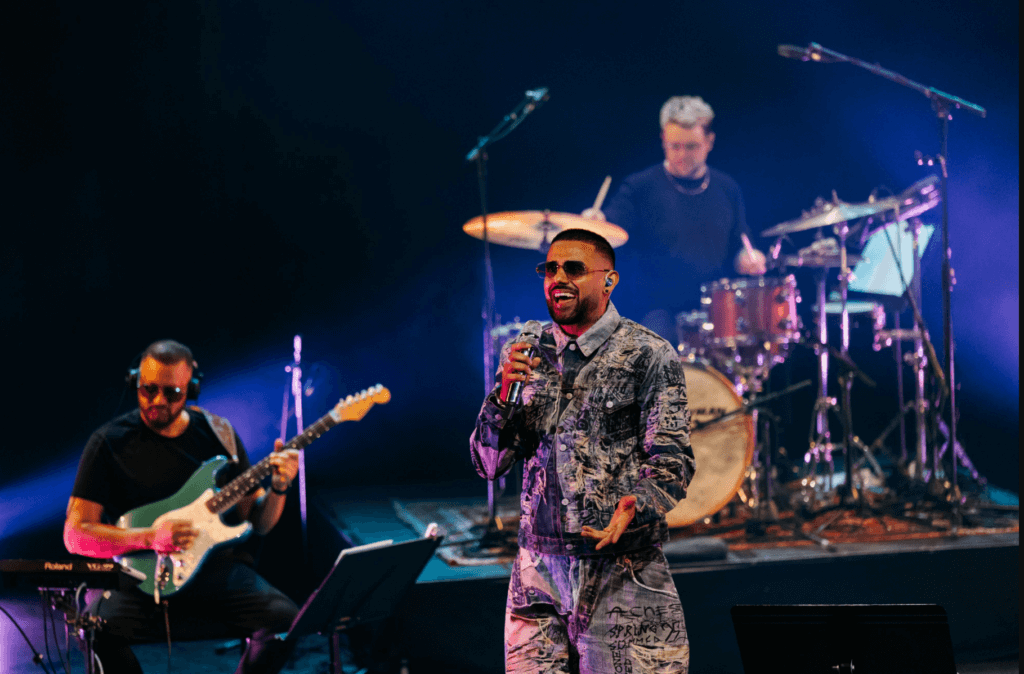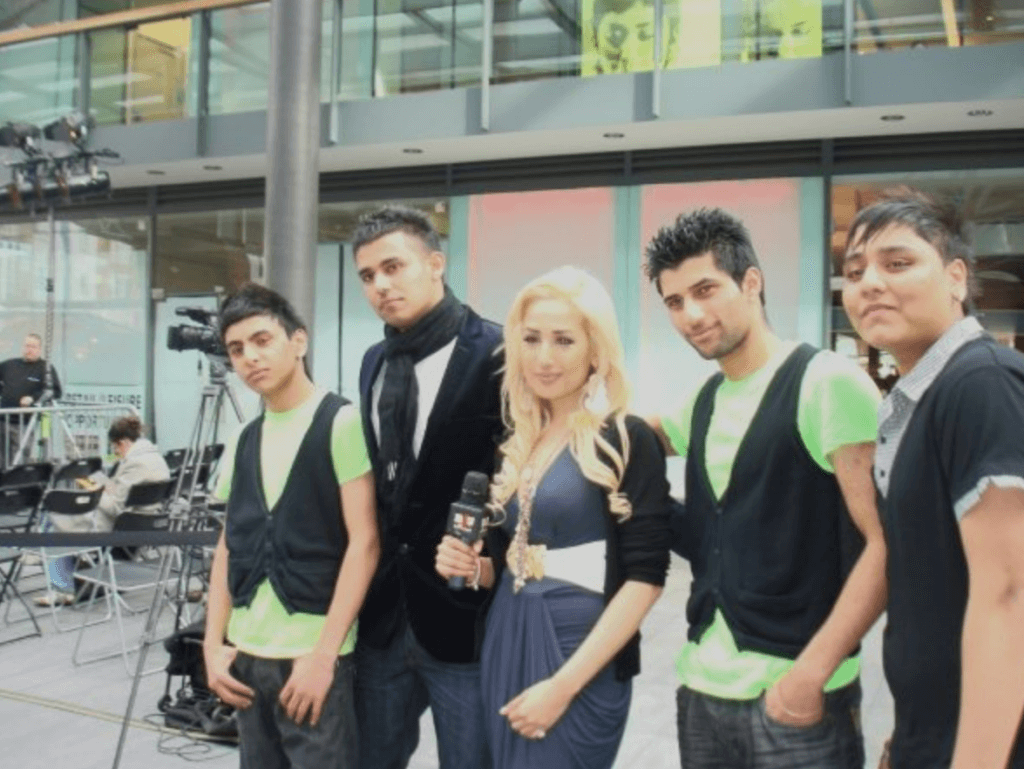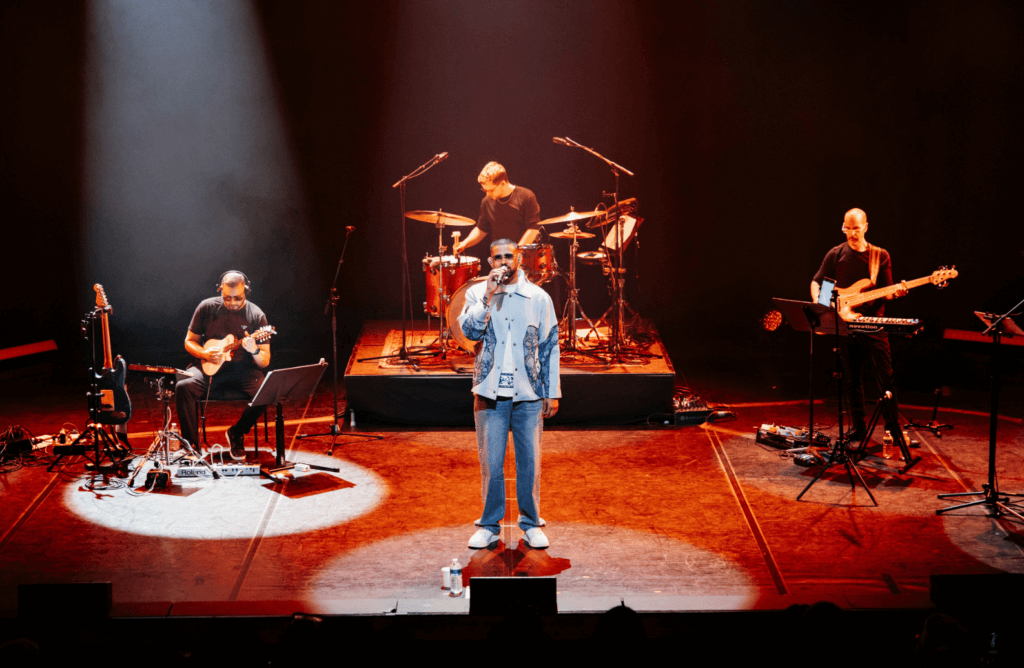
Photo credit — Sophie Harbinson (@sharbinson)
Let’s take it back to 2009. I’m working at B4U, the Bollywood TV channel, and for the first time, we’re putting on a music festival in Spitalfields Market, ‘East B4U’. One of the artists on our line-up is a young, slightly shy but incredibly gifted performer named Jaz Dhami. He arrives with humility and raw talent, and as he steps on stage, it’s clear this is the beginning of something special. I remember writing about him in the B4U print magazine soon after, calling him “one to watch”. From that point on, Jaz became a constant presence in the British Asian music scene, and arguably one of its most consistent and enduring voices. B4U followed him closely – from Desi Beatz gigs to headline shows – covering each step of a career that was only just taking flight.

Jaz Dhami 2009 performance at East B4U Spitalfields Market
Jaz’s music, from Theke Wali to global hits like High Heels, Aitvaar, Bas, Beparwaiyan, Teri Ah and Oye Hoye Oye Hoye, earned him a place on every wedding playlist and club setlist. But behind the dancefloor anthems and international recognition is a journey marked by far more than musical success. It is one that includes profound personal loss and a quiet battle with serious illness.
Fast forward to Friday 16 May at the Southbank Centre, and I’m sitting among an eager audience for BAM! A Celebration of British Asian Music. Produced by the incredibly talented Sumeet Chopra and hosted by Anushka Arora, the night is designed as a tribute to the roots and richness of our music. Jaz takes centre stage, harmonium in hand, and opens with a hauntingly beautiful rendition of Nusrat Fateh Ali Khan’s Sajna Tere Bina. From that moment on, I am completely immersed. His harmonies, his range, his ability to bring emotional depth to every line – this wasn’t just a performance, it was something far more intimate. Jaz made us feel music again.
Having trained in classical Punjabi music from a young age, Jaz transitions seamlessly between vocal styles and languages. His stage presence is confident but grounded. He wears his British Punjabi identity with genuine pride. What begins as a seated, reflective concert gradually transforms. As the tempo lifts and he moves into Theke Wali, the entire hall is on its feet. Bhangra breaks out between the rows. The Queen Elizabeth Hall becomes a mehfil, a gathering of joy, rhythm and connection.
But it’s in the slower, more introspective moments that Jaz truly shines. When sings Sajna Ve Sajna by the legendary Gurdas Maan, it is filled with reverence and warmth. Then comes Mirza – Surinder Shinda’s iconic folk ballad – a personal favourite of mine. Hearing Jaz perform it live is something special. It’s not just nostalgia, it’s living heritage. Each note carries the weight of tradition, and each word lands with impact.

Photo credit — Sophie Harbinson (@sharbinson)
What makes the performance even more powerful is the deeper story behind it. In recent years, Jaz has endured enormous personal challenges. He lost his brother, DJ Harvey, to a brain tumour. Harvey wasn’t just family – he was a musical partner from the very beginning. They started out as teenagers and shared a creative bond that shaped both their careers. Harvey was, in many ways, Jaz’s mirror and motivator – a gifted pianist and perfectionist who believed in pushing boundaries.
At the same time, Jaz has been facing his own battle with cancer. This struggle, although private, has deeply influenced his recent shift in focus and energy. It led him to embrace a more holistic lifestyle and reconnect with the roots of Punjabi music and spirituality.
That evolution was evident throughout the performance. You could hear it in the way he sang, feel it in the atmosphere he created. This was not just a concert, but a moment of reflection, resilience and rebirth.
A particularly moving highlight was Meh Panjabi Boli Ah. Jaz has often spoken about how personal that song is to him, and live on stage, its meaning resonated even more. It was a love letter to identity, to language, and to cultural pride.
With a live band featuring dhol, tabla, drums, keys and flute, the soundscape was rich and immersive. Every musician added a layer of texture and feeling. This wasn’t just a polished performance, it was an honest one, full of soul and intention.
South Asian artists have long had to fight for their space in cultural institutions. On this night, Jaz Dhami didn’t just take up space – he redefined it. With grace, with depth, and with unmatched musicality. A beautiful tribute to the past, a celebration of the present, and a beacon for what’s possible in the future.
Rishma
Latest posts by Rishma (see all)
- INTERVIEW | BRISTOL DUO CODE RED DISCUSS NEW MUSIC AND THEIR HIP-HOP JOURNEY — February 23, 2026
- BREAKIN’ CONVENTION FESTIVAL 2026 — THE INTERNATIONAL FESTIVAL OF HIP-HOP THEATRE RETURNS — February 11, 2026
- YOU ME & COMEDY – WITH COMEDY LEGENDS MIKE EPPS, EDDIE GRIFFIN & MARLON WAYANS FOR ONE OF THE BIGGEST NIGHTS IN COMEDY THIS YEAR — January 28, 2026
